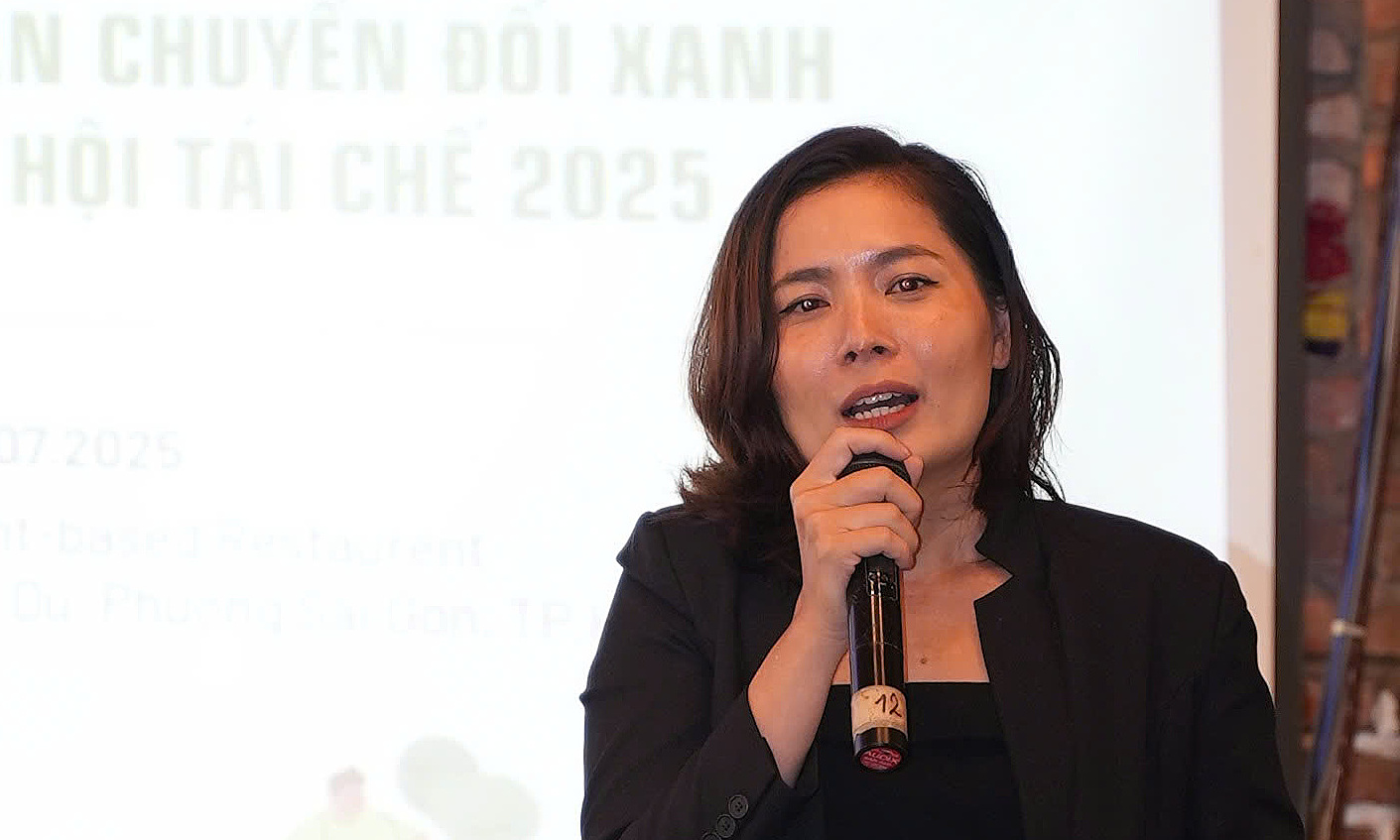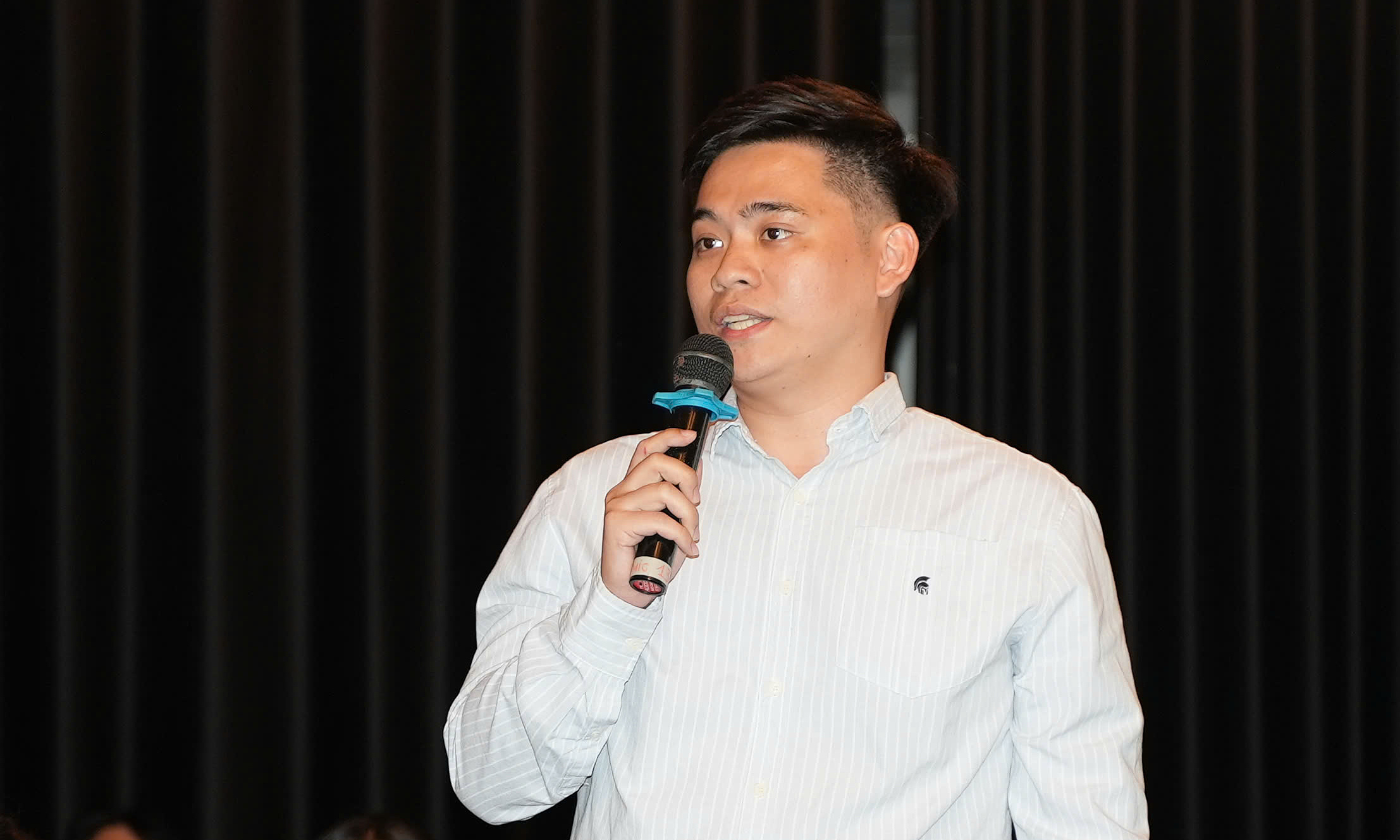A 3.8-liter bottle of Fuwa Biotech dishwashing liquid costs 335,000 VND, two to three times more expensive than conventional products of the same volume. This is because the company's dishwashing liquid is made with biological enzymes from pineapple peels.
According to the company, this technology is environmentally friendly and helps consumers worry less about the safety of cleaning chemicals in their daily lives. However, Vo Van Luat, Fuwa Biotech's Southern Manager, admitted that the high price is a challenge.
"The price of environmentally friendly products is still a barrier to market expansion," Luat said at a press conference for the Green Transformation Forum & Recycling Day 2025 organized by the Vietnam High-Quality Goods Association last week.
 |
Nguyen Bich Dien, Deputy General Director of Faslink, at the event on the afternoon of 23/7. Photo: BSA |
Nguyen Bich Dien, Deputy General Director of Faslink, at the event on the afternoon of 23/7. Photo: BSA
Agreeing, Nguyen Bich Dien, Deputy General Director of Faslink, said consumers are still more concerned about price than recycled sources. Recently, Faslink launched a fabric made from pineapple leaf fiber. This product line still has a high cost due to the significant expenses of research, testing, and production.
"Customers are currently very concerned about price, while green technology solutions like pineapple fiber fabrics cannot yet match the price of traditional products like polyester or cotton," Dien said.
According to a recent survey by the Vietnam High-Quality Goods Association, Vietnamese consumers view "green consumption" as using environmentally friendly products that are naturally sourced or produced through sustainable processes.
Their level of interest is increasing, with respondents saying they support green consumption and buying products made from natural or recycled materials, scoring 4 or higher on a scale of 1 to 5, with 5 being "very important." However, price is also among the top 5 criteria when choosing products, accounting for 44% of concerns.
In addition to price, businesses pursuing green production say they also face difficulties in areas such as input materials or the lack of a highly interconnected ecosystem. For example, Duy Tan Recycling specializes in collecting and recycling used plastic bottles to produce new food-grade plastic bottles.
Head of Sustainable Development, Le Viet Dong Hieu, said the biggest challenge is the quality of input materials because collected plastic bottles are often very dirty. Therefore, proper waste sorting at the source is essential.
"When consumers are aware of sorting, the business's input materials will be cleaner and more uniform. This optimizes processing and production costs, contributing to reducing the final product price," Dong Hieu said.
 |
Le Viet Dong Hieu, Head of Sustainable Development at Duy Tan Recycling, at the event. Photo: BSA |
Le Viet Dong Hieu, Head of Sustainable Development at Duy Tan Recycling, at the event. Photo: BSA
Similarly, at Faslink, Nguyen Bich Dien said she has been in contact with many universities and knows of many research projects related to sustainable apparel materials, such as fibers from banana peels or mushrooms. However, most initiatives are still in the laboratory and cannot yet be put into industrial production.
Therefore, she believes there needs to be interdisciplinary connections and support mechanisms to form complete ecosystems so that green solutions can quickly move beyond the testing phase and reach the market. "Commercial pineapple fiber fabrics are a rare case of collaboration from many parties in the supply chain," she exemplified.
Despite the many obstacles, experts believe that sustainable production is an inevitable trend, offering long-term competitive advantages. Dang Thanh Long, Head of Training and Sustainable Development at Interek Vietnam, believes the current trend is toward balancing economic, environmental, and social factors (ESG).
In the context of rapid technological development, meeting material needs is no longer a difficult problem. The greater challenge is how to live in a healthy environment and build kind and humane social relationships. "Young people who grasp this trend early have many opportunities," he said.
According to Vu Kim Hanh, President of the Vietnam High-Quality Goods Association, green transformation "is no longer a theory, but a matter of survival." She noted that the positive aspect is the growing awareness among startups and businesses of the competitive opportunities presented by green production.
Vien Thong












